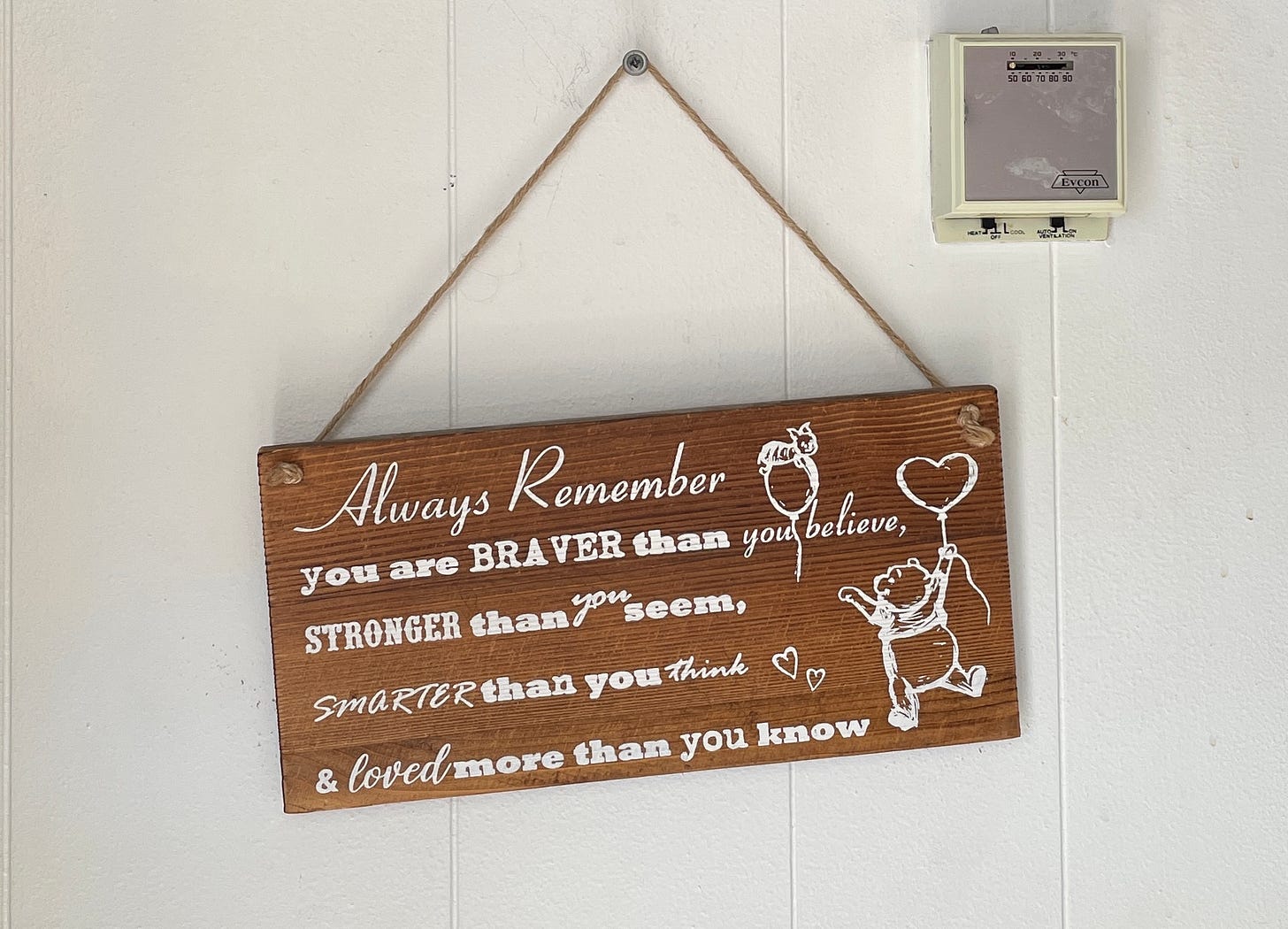Dear friends,
This morning I was reminded of how many forms self-caregiving can take—because today I had my annual mammogram.
As we chatted, the technician shook her head and shared that she’s nearing retirement age and really needs to start taking better care of herself. She wants to bicycle more and get back to lifting weights. Turns out we share a fondness for the EGYM, which guides those of us who don’t love weight rooms through a series of weightlifting exercises (check it out!).
Of course we all know that eating “right” and exercising are key to maintaining our health, but when we’re in the throes of caring for others and helping manage other people’s lives, it’s all too easy to put off health appointments. Like mammograms.
So here’s your friendly reminder to get that scheduled.
Bonus: Below is a poster I saw at the clinic that offers an excellent visual to make the language of breast density on those post-test letters make more sense:
As I mentioned earlier, this summer I am sharing some of my favorite posts from the past year and a half. It’s one way I’m implementing some self-care—by taking a break from doing fresh Sandwich Season writing.
In that spirit, I am sharing a post from from April 10, 2025.
Take care, everyone!
Sarah
P.S. Yesterday, Jon and I held an official drawing for two copies of my memoir, The Same Moon, in celebration of its 5-year book-iversary! (I wrote out the names of all of my paid subscribers and put them in Jon’s sunhat, which I then held out of reach for him to draw them from.) I will alert the winners shortly. Special thanks to everyone who has joined me over the past several months as paid subscribers!
Revisiting self-care
So many of my recent conversations have been variations on a theme: the importance of self-care. (Yes, this could be in part because I wrote about caregiving and self-caregiving last week.)
But what I’m finding is that whether people I’m visiting or corresponding with are caregiving for the older, the younger or the same generation, they so often share their struggles to take a break. They say, “But I’m OK.” “I can handle it.” “We don’t need help yet.” “It would be selfish” to leave the loved one alone or with someone else.
I get it. And yet I’m going to say something that might be hard to hear, but I say it with love in my heart:
When you are a caregiver, the kindest, most generous thing you can do for the person or people you’re caring for is set aside at least a tiny bit of space to care for yourself.
I can almost feel the resistance rising and hear various reactions. “As if!” “I don’t have time.” “I don’t have the energy.” “It’s just one more thing.” “You have no idea.”
This isn’t me projecting what I think you might be feeling and thinking.
It’s what I too have felt and said so many times before.
But here’s what I’ve learned: When we don’t care for ourselves, we are far more apt to wear ourselves out—physically, mentally, emotionally, spiritually. And it’s a very short path from carrying the stretcher (serving as the caregiver) to lying on the stretcher (becoming the person who needs the care).
And then what? Then someone else needs to step in.
I speak here from experience—first, caring for a child with special needs while trying to maintain some semblance of a career and my own life while living far from family.
Then, having moved closer to family and finding my mom was further on her dementia journey than I’d realized, I continued to care for that child, who was by then a challenging teenager, while also offering various types of caregiving to my mom, while my dad worked relentlessly hard to hold everything together—caring for her, cooking and keeping house.
Then, less than two months after my mom died, my dad had a health crisis of his own: a stroke. I don’t want to call my dad a “cautionary tale” … but that is the phrase that comes to mind.
Am I saying that if my dad had engaged in more self-care, he wouldn’t have had a stroke? I don’t know. But I could see he was wearing himself out. Everyone could see he was wearing himself out.
At the time I was ping-ponging between my house and my parents’ house, which I was clearing out, and the retirement community where they had moved. At that latter stop, staff took me aside repeatedly to share their worries about Dad, who looked exhausted. Friends of his took me aside as well, expressing the same concerns. I prodded and prodded my dad to take more breaks, to hand off some of his responsibility. And sometimes he did.
Studies have shown that caring for a spouse with dementia increases the risk of mortality for the caregiver. One 2018 study found that 18 percent of caregivers of spouses with Alzheimer’s disease or a related dementia died before the people they were caring for. (You can find the article in Alzheimer’s & dementia: translational research & clinical interventions.)
I fully admit that some of my eagerness to have my dad take breaks came from my fear that something would happen to him, and my mom’s care would fall to me. I would have been stretched between her care and my son’s, and the work on my parents’ house, and at the time, I already felt as if I was running out of fingers.
I’m grateful my dad stayed well as long as he did. And now, a year and a half post-stroke, I’m so thankful for his recovery. He plays trombone in his jazz band, enjoys trivia contests and card games, and spends time with friends, old and new—and of course with our family!
Self-care and you
So. Self-care.
I am encouraging everyone to find some—whether you are caring for others right now or not. Find at least a tiny bit of space for you. Make it intentional, and make it a habit.
Interpret that as you will. But I want to emphasize that self care does not have to take hours or money or even very much energy.
Maybe you’re a caregiver with no one else to spell you off. Take a few minutes to pay attention to your breath. Inhale for a count of four. Pause. Exhale for a count of four. Pause. Repeat for a minute or two … or longer, if you like.
Maybe you have more time available. This post by Dr. Jake makes the case for walking: 5,000 steps a day can boost mood, and 7,500 steps a day leads to a 42 percent lower risk of developing depression.
Maybe walking is not your thing. But I bet you have something that relaxes you and brings you joy. How often do you do that?
I’ll never forget the therapist who assigned me the task of writing down 50 things that brought me joy. Then she prescribed doing 12 of those every day. Hah! I thought she was crazy. I never reached 12, but I started finding my way to do a couple or at least one a day.
A question for you: What brings you joy? Or what’s your go-to self-care strategy?
That experience inspired me to start a blog—50 Joys—in which I shared where I was finding joy in what at that time, back in 2011, felt like a very overwhelming and disheveled life.
I wrote more about that, plus an elder friend’s attitude and my dad’s self-care epiphany six months after my mom died, here:
You are not selfish
Before I step off my self-care soapbox, I want to take aim at the idea that self-care is selfish.
I hear it from other caregivers, and I have heard that accusation in my own mind—as I’ve abandoned whatever I’m “supposed to be doing” to roll out my yoga mat, get out my paints or drive to the Y to spend an hour crazy-dancing in a packed Zumba studio.
The thing is, during and after each escape, I have felt joy or a sense of peace, each of which is a delight in itself. Doing something I love helps me maintain (and sometimes regain) my identity and my sense of self.
But the benefits don’t stop there.
I bring those positive feelings back to my caregiving and other responsibilities, and they seem to beget more of the patience and the creativity that I and those around me need.
This is why I say that taking care of ourselves is good. When the “selfish” word bubbles up in my mind, I own it and reframe the label into benevolent selfishness. I wrote more about that idea here:
Because if you want to talk about benevolence or kindness, let’s be real. Caring for ourselves helps us continue to do what everyone around us hopes we will do: Keep going! Keep caring.
Self-care helps you to be who you are—a gift to yourself, your family and your community.
What’s more benevolent than that?









